Here is a fascinating look into the language of Telugu and Indian Muslims – and just how deep the history of Islam is in this part of the world!
Here is a fascinating look into the language of Telugu and Indian Muslims – and just how deep the history of Islam is in this part of the world!
Telugu, a Dravidian language, holds the status of an official language in two Indian states, Telangana and Andhra Pradesh. It ranks as the second most spoken language in India and fifteenth worldwide, boasting over seventy-five million speakers by the twenty-first century. Often referred to as the “Italian of the East,” Telugu has a rich linguistic and literary heritage.
The evolution of Telugu owes much to the diverse contributions of numerous individuals, transcending religious boundaries. Despite prevailing misconceptions that associate Telugu exclusively with a particular sect and assume Muslims adhere solely to Urdu, historical evidence contradicts this notion.
The Andhra region’s Muslim community has played a significant role in the growth and enrichment of Telugu. Contrary to stereotypes, Muslims in the region have not only embraced Telugu as their language but actively participated in its development.
History reveals that Muslims in Andhra have contributed meaningfully to Telugu literature, debunking the myth of linguistic exclusivity. Muslim Telugu writers have notably delved into literary works inspired by epics such as Mahabharata, Ramayana, and Bhagavat. Their literary endeavours not only showcase a deep engagement with Telugu but also underscore their secular perspective by selecting classical themes that resonate across diverse cultural and religious boundaries.
In essence, this study aims to unravel the historical chapters that illuminate how Muslims have intricately engaged with Telugu as a language and literature, showcasing a harmonious coexistence and mutual enrichment between cultures and communities in the region.
Nurturing of Telugu Language and Literature During the Reign of Qutub Shahi Rulers
The Qutub Shahi rulers played a pivotal role in elevating the status of the Telugu language during their reign. Despite Persian being their mother tongue, they recognized the importance of Telugu as the language of their province and actively promoted its use. The Qutub Shahi Sultans and their officials were ardent supporters and patrons of the Telugu language, honouring numerous Telugu scholars and poets.
Ibrahim Quli Qutub Shah, the second ruler of the dynasty, made significant contributions to the promotion of Telugu. Under his rule, the Telugu language gained prominence in literary activities. Ibrahim Quli Qutub Shah displayed inclusivity in his administrative affairs, eschewing discrimination based on sects. He appointed eligible individuals, many of whom were Telugu speakers, particularly from the Hindu community, as Governors and officers in his court.
During Ibrahim Quli Qutub Shah’s reign, Telugu poets were highly respected alongside Arabic and Persian poets. Notable poets during this period included Addanki Gangadharudu, Singanacharyudu, and Kandukuru RudraKavi. RudraKavi, in particular, received a village named Chintapalem as a gift from Ibrahim Quli Qutub Shah and was acclaimed by poets as ‘Malkibha-rama.’
Telugu was officially recognized as the second language after Urdu during the rule of the Qutub Shahi rulers. Many rulers supported poets by conferring titles and valuable gifts. For instance, the king bestowed the title of ‘Malik-u-shura’ upon the Telangana poet Ponanaganti.
Mohammad Quli Qutub Shah continued this tradition by conferring the title of ‘Malikushura’ upon the renowned Telugu poet Pattamitta Kavi, appointing him as the Chief Pandit of his court. Sarang Timmaya and RajMalla Reddy were also associated with the court of Mohammad Quli Qutub Shah. Sarang Timmaya, having experienced the reigns of both Mohammad Quli Qutub Shah and Mohammad Qutub Shah, praised their liberalism and passion for knowledge. Mohammad Qutub Shah rewarded the poet Kami Reddy with a palanquin, a Morchal (a fan made of peacock feathers), and precious stones, showcasing the rulers’ appreciation for literary contributions in Telugu.
Kavisekhara Dr. Umar Ali Shah: A Prolific Telugu Scholar and Freedom Fighter
Dr. Umar Ali Shah, a distinguished Telugu scholar, made significant contributions to literature with an extensive body of work that includes over fifty books. These writings span a wide array of topics, reflecting his thoughts on patriotism, spiritual philosophy, and more. Serving as the editor of the Spiritual Monthly Magazine (Tatwaznanamu), Dr. Umar Ali Shah’s notable works encompass diverse genres such as drama, philosophy, and historical narratives.
Born on August 2, 1966, Dr. Umar Ali Shah played a pivotal role in the struggle for freedom. Actively engaging in the Khilafat movement, a unique anti-British initiative that saw students donning Gandhi caps in the early 1920s at the Victoria Diamond Jubilee Medical School (later Andhra Medical College), he demonstrated a fervent commitment to the cause. As the sixth Peethadhipathi of Sri Viswa Vignana Vidya Adhyatmika Peetham and a member of the Indian National Congress, Dr. Umar Ali Shah’s influence extended beyond his literary pursuits.
In addition to his role as the national secretary of the Khilafat movement (1924), Dr. Umar Ali Shah held positions of significance, serving as the vice president and secretary of the Muslim League, Madras branch. His multifaceted involvement in social and political spheres attested to his dedication to the larger cause of societal progress.
Among his notable works are titles such as ‘Danava Vadha,’ ‘Maha Bharatha Kourava Rangamu,’ ‘Sufi Vedanta Darsamu,’ ‘Anasuya Devi,’ ‘Kala’ (Drama), ‘Prabhata Kathavali,’ ‘Vishada Soundaryamu,’ ‘Vichitra Bhilvaneeyamu,’ ‘Brahma Vidya Vilasamu,’ ‘Omar Khayyam,’ ‘Parathatva Keerthanalu,’ ‘Tatva Sandesham,’ ‘ChandraGupta,’ ‘Mani Mala,’ ‘Shantha,’ ‘Khanda Kavyamulu,’ ‘Barhini Devi,’ ‘Sadhana Padhamu,’ ‘Padmavathi,’ ‘Sri Mohammad Rasul Vari Charitra,’ and ‘Chandragupta.’
Works such as ‘Anasuya Devi,’ ‘Mahabharata Kauravarangamu’ by Umar Ali Shah, ‘Rayabaramu’ by Mohd Qasim Saheb, ‘Amba’ by Papa Saheb, etc., belong to the Mahabharata. On the other hand, compositions like ‘Uttara Rama Charitra,’ ‘Pratima’ by Mohd Qasim Saheb, ‘Seetharama Satakam’ by Syed Ali, and ‘Sreemadvalmiki Ramayanam’ by Umar Ali Shah are derived from the Ramayana.
Quran Translation and Explanation in Telugu
The translation and explanation of the Holy Quran into Telugu signify a significant effort to bridge linguistic and spiritual gaps. These translations, available in Telugu, provide a valuable resource for the Telugu-speaking community, enhancing accessibility and fostering a nuanced understanding of the Quran’s teachings. The diversity of translations reflects a commitment to making the sacred text more accessible to a broader audience.
In the realm of Telugu translations of the Holy Quran, Dr. Abdul-Raheem Mohammed’s Divya Quran Sandesham and Janab Hamidullah Sharief Saheb’s Divya Quran stand out as significant contributions. Another notable work is Bhavamrutam by Janab Abdul Irfan Saheb, adding depth to the understanding of the sacred text.
Janab S M Mallick Saheb’s Quran Avagahanam, a translation based on Tafheemul Quran by Maulana Sayyed AbulAlaMaudoodi, enriches the Telugu literature on Islamic teachings. Additionally, Muhammad Qasim Khan’s comprehensive work, The Holy Quran in Telugu with Notes, provides valuable insights for a more nuanced understanding. These translations collectively enhance accessibility and comprehension of the Quran within the Telugu-speaking community.
Research on the Contribution of Muslims to Telugu Literature
Dr. Shaik Mastan stands out as a contemporary Muslim author in Telugu literature. What sets him apart is his focus on documenting the contributions of Muslims, demonstrating his distinctive approach. With in-depth research on this subject, he has penned a substantial body of work, comprising 350 pages in the Telugu language.
Among his notable works is “Telugu Sahityam – Muslimlaseva” (Muslim Contribution and Telugu Literature). Dr. Shaik Mastan has also authored “Telugu Sahityavyasalu” (Telugu Literary Essays), showcasing his versatile engagement with the nuances of Telugu literature.
Initiatives of NGOs
TANA, established in 1977, serves the social, cultural, and educational needs of the Telugu community in North America and beyond. In pursuit of cultural appreciation, they organized the “Muslim Contribution to Telugu Literature – TANA Literary Meet” conference.
This inclusive event aimed to showcase the significant impact Muslims have had on regional language literature. The conference featured a 2-hour video presentation, highlighting insights from current Muslim authors, other religious authors, and visitors.
Conclusion
Within the Telugu literary landscape, a diverse group of individuals has contributed significantly to the dissemination of Islamic messages. This includes translations of the Holy Quran and biographies of Prophet Muhammad.
Beyond religious texts, many have ventured into creative expressions, producing biographies, free verse, novels, stories, short stories, essays, khandas, kavyas, satakas, harikathas, and more.
The primary objective of this research is to dispel the misconception that Telugu is exclusively associated with a particular sect, and that Muslims are confined to using Urdu alone. It is important to emphasize that Telugu transcends religious boundaries; it is not merely a language of faith but a language that belongs to a specific region, namely Andhra Pradesh.
By highlighting the diverse literary contributions of Muslims in Telugu, this article aims to foster a more accurate understanding of the language’s rich cultural and linguistic heritage.
References
Ashraf Raf, Dakhni Literature: History, Culture and Linguistic Exchanges, Research Article published in Languages and Literary Cultures in Hyderabad edited by Kousar J. Azam.
https://en-academic.com/dic.nsf/enwiki/7560150
Mastan, Shaik, Peace And Prosperity Through Literature in Multi-Cultural Society (With Special Reference to Telugu Poetry of Indian Muslims) https://www.ayk.gov.tr/wp-content/uploads/2015/01/MASTAN-Shaik-PEACE-AND-PROSPERITY-THROUGH-LITERATURE-IN-MULTI-CULTURAL-SOCIETY-WITH-SPECIAL-REFERENCE-TO-TELUGU-POETRY-OF-INDIAN-MUSLIMS.pdf
https://archive.org/details/VolumeITheHolyQuranInTeluguWithNotesByMuhammadQasimKhan/page/n5/mode/2up





